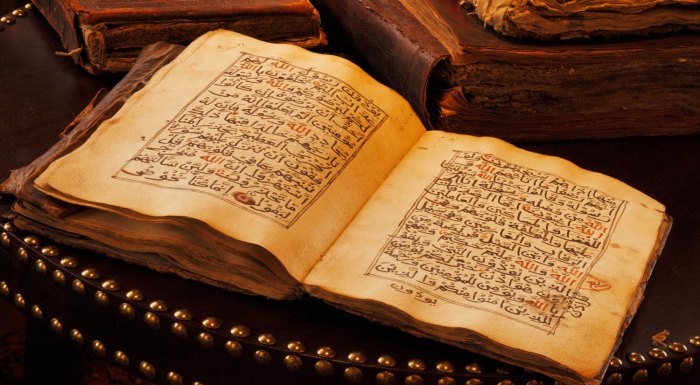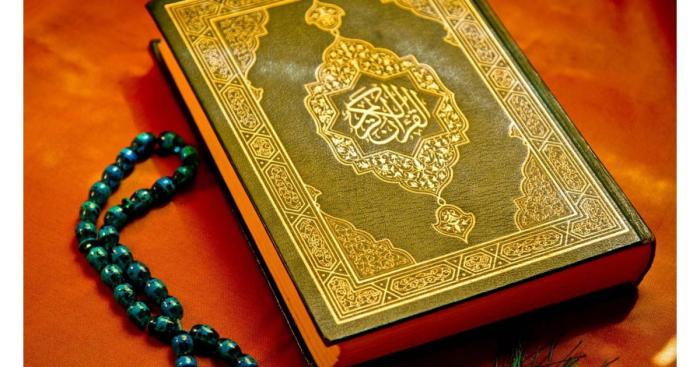Quran definition ap world history – Introducing the Quran: Definition and Significance in AP World History, this comprehensive exploration delves into the essence of the Quran, its historical context, and its profound impact on Islamic civilization and beyond.
The Quran, a sacred text revered by Muslims worldwide, holds a central position in Islamic beliefs and practices, shaping the very fabric of Islamic law, ethics, and spirituality.
Definition of the Quran: Quran Definition Ap World History
The Quran, also known as the Holy Quran or the Mushaf, is the central religious text of Islam. It is believed to be the verbatim revelation of God (Allah) to the Prophet Muhammad (PBUH) over a period of approximately 23 years, beginning in 610 CE.
The Quran is the foundational text of Islam, providing guidance on all aspects of life, including religious beliefs, ethical principles, legal rulings, and social norms.
The term “Quran” comes from the Arabic word “qara’a,” which means “to recite” or “to read.” This reflects the central importance of recitation and reading in the practice of Islam, as the Quran is meant to be read aloud, recited, and contemplated upon.
The Quran is unique among religious texts in several respects. It is believed to be the verbatim word of God, without any human intervention or alteration. It is also considered a literary masterpiece, renowned for its eloquent language, poetic style, and profound insights into human nature and the divine.
Historical Context of the Quran’s Revelation

The Quran was revealed during a period of significant social and religious upheaval in the Arabian Peninsula. The region was home to a diverse array of religious beliefs, including polytheism, Christianity, and Judaism. The Prophet Muhammad (PBUH) emerged as a religious reformer, calling for the worship of one God and the rejection of idolatry.
The Quran’s revelation began in 610 CE, when Muhammad (PBUH) is said to have received the first revelation from the angel Gabriel. The revelations continued over the next 23 years, with Muhammad (PBUH) receiving them in piecemeal fashion. He would then recite these revelations to his followers, who would memorize and record them.
The gradual process of revelation allowed the Quran to address the specific needs and challenges faced by the early Muslim community. It provided guidance on issues ranging from religious doctrine to social and political organization.
Content and Structure of the Quran

The Quran consists of 114 chapters (surahs), each divided into verses (ayahs). The surahs are not arranged chronologically but rather according to their length and thematic content. The longest surah is Al-Baqarah (The Cow), with 286 verses, while the shortest surah is Al-Kawthar (Abundance), with only three verses.
The Quran’s language is Arabic, and it is considered a masterpiece of Arabic literature. The Quran’s style is often poetic, employing various literary devices such as metaphor, simile, and parallelism. It is also known for its powerful and evocative imagery.
The Quran’s content covers a wide range of topics, including:
- Beliefs and doctrines
- Ethical principles
- Legal rulings
- Social and political guidance
- Stories of prophets and nations
- Scientific and historical insights
Significance of the Quran in Islam
The Quran is the central religious text of Islam and the primary source of guidance for Muslims worldwide. It is believed to be the verbatim word of God, and its teachings are considered binding upon all Muslims.
The Quran provides guidance on all aspects of life, from religious beliefs to ethical principles, social norms, and legal rulings. It is the foundation of Islamic law (Sharia) and serves as a guide for personal conduct, social interactions, and political organization.
The Quran is also a source of spiritual inspiration and guidance for Muslims. It contains numerous verses that encourage reflection, contemplation, and the remembrance of God. It is recited daily in mosques and homes, and its teachings are studied and discussed by Muslims of all ages.
The Quran in World History

The Quran has had a profound impact on world history, extending far beyond its influence on Islamic civilization.
In the realm of literature, the Quran has been a major source of inspiration for Arabic poetry, prose, and calligraphy. Its eloquent language and literary devices have influenced the development of Arabic literature and culture.
The Quran has also had a significant impact on Western thought and religion. Through translations and interpretations, the Quran has influenced the development of philosophy, theology, and comparative religion. Its teachings on monotheism, ethics, and social justice have resonated with people of different faiths and cultures.
FAQ Insights
What is the Quran?
The Quran is the sacred text of Islam, believed by Muslims to be the verbatim revelation of God (Allah) to the Prophet Muhammad.
What is the significance of the Quran in Islam?
The Quran serves as the primary source of divine guidance for Muslims, providing essential teachings on faith, worship, ethics, and social conduct.
How was the Quran revealed?
The Quran was revealed gradually over a period of approximately 23 years, through the angel Gabriel to the Prophet Muhammad.
What are the main themes of the Quran?
The Quran covers a wide range of topics, including the oneness of God, the life of the Prophet Muhammad, moral and ethical teachings, and the importance of social justice.